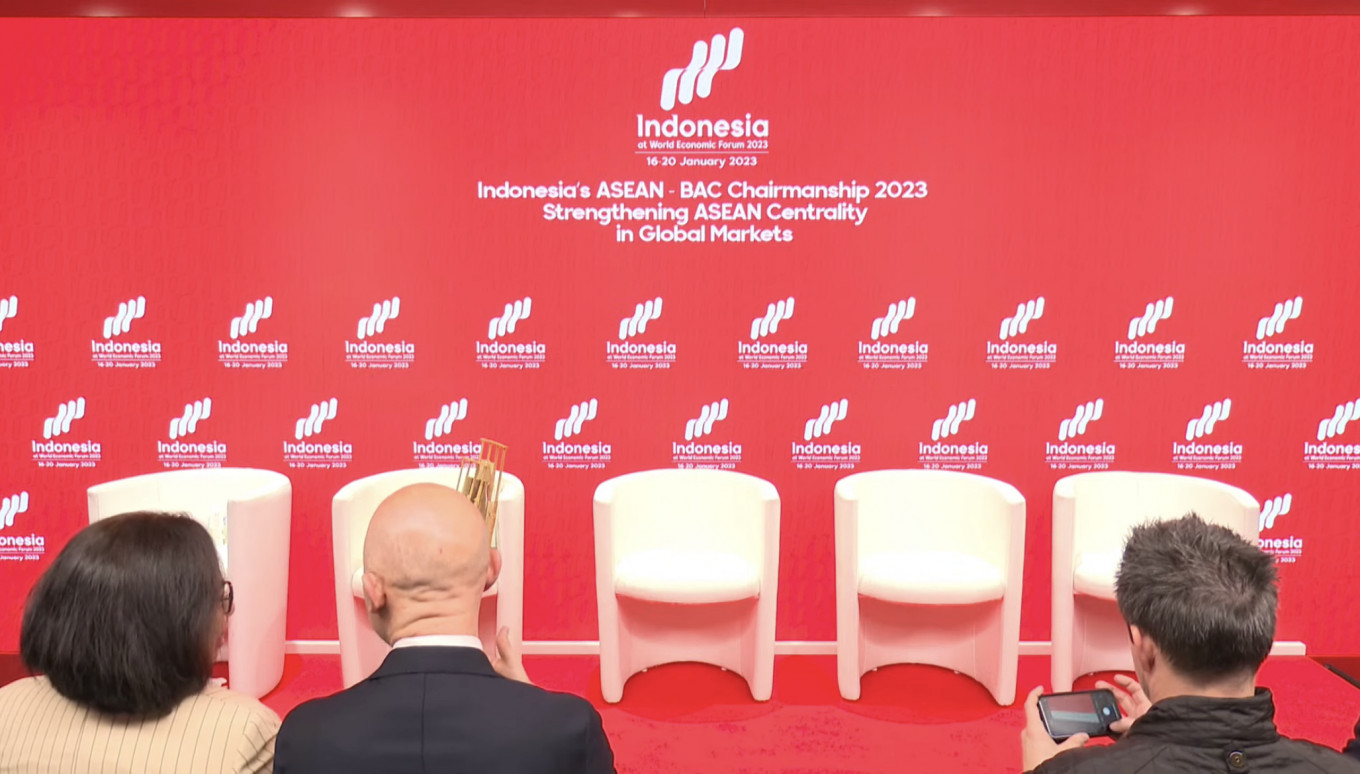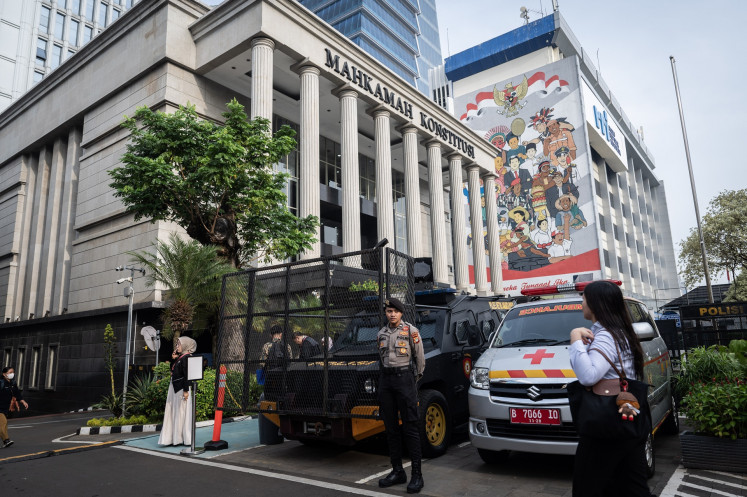RI to ‘bring back’ ASEAN centrality with focus on economy
Indonesia’s private sector has set out to make Southeast Asia the center of gravity.
Change text size
Gift Premium Articles
to Anyone

E
mboldened by its leadership of the Business 20 (B20) agenda under last year’s Indonesia-led Group of 20 (G20) forum, Indonesia’s private sector has set out to make Southeast Asia the center of gravity in a world struggling for economic and political direction.
ASEAN’s claim to leadership had always been belittled elsewhere, particularly in the last few years, ASEAN Business Advisory Council (BAC) chairperson Bernardino “Dino” Vega told executives in at the World Economic Forum in Davos, Switzerland.
Dino was attending the elitist gathering as part of a business and government delegation seeking to pitch their country as an investment destination through the forum’s Indonesia Pavilion.
The occasion is intertwined with Indonesia’s chairmanship of ASEAN this year, which currently grants the Indonesian Chamber of Commerce and Industry (Kadin) the role of leading the BAC.
“In the past few years, we’ve seen a waning of the idea of ASEAN centrality, so this year, Indonesia wants to bring it back,” Dino, who is also Kadin’s deputy chairperson for international affairs, announced on Wednesday.
According to its charter, ASEAN aims to “maintain the centrality and proactive role of ASEAN as the primary driving force in its relations and cooperation with its external partners in a regional architecture that is open, transparent and inclusive”.
ASEAN centrality is therefore understood to refer to the ASEAN countries’ ambition to collectively conceptualize and drive cooperation in the region, impacting both security and economic affairs.
To support that notion, the Trade Ministry aims for ASEAN to embark on digital transformation and trade policy reform, with the latter including the creation of an ASEAN Services Facilitation Agreement as an amendment to the ASEAN-Australia-New Zealand free trade area.
"ASEAN must play the role of being the main engine in the region," Deputy Trade Minister Jerry Sambuaga said in a statement issued on Saturday.
The block’s ambition got battered recently by the rise of protectionism and wealth disparity between countries in the region, with notable inequality seen in the fields of education, health care and median income.
Indonesia, the Philippines, Cambodia, Laos and Timor-Leste remain below the global average on the United Nations’ inequality-adjusted human development index.
“We also see member countries in ASEAN often focused on their own internal affairs a little too much rather than powering the value of ASEAN as a whole,” Dino admitted.
Read also: ASEAN needs to look beyond Myanmar’s Five-Point Consensus
Yet these problems did not hamper the region’s path to “consequential economic power”, he said, as the region’s GDP and exports were estimated to be the fifth-largest and fourth-largest in the world last year, respectively.
The region would inevitably receive huge foreign investment and become increasingly connected with global supply chains, Dino said, pointing to ASEAN’s neutrality in the geopolitical competition between China and the United States.
What ASEAN needed to do was to strengthen its economic fundamentals and keep an eye on further progress, he noted.
“Today, ASEAN is no longer seen as a regional power that only sits on the sidelines of global economic development,” Dino added.
“Today, ASEAN instead is seen as a multilateral grouping that is regarded as the future of production and consumption, or as our government has called it, the epicenter of growth.”
Micro, small and medium enterprises (MSMEs) will be the key focus this year, the BAC has announced, given the segment’s huge importance for development by providing around 85 percent of overall employment and 44.8 percent of economic output in the region.
To support MSMEs, the BAC would strive to spur growth and financial inclusion through efforts including an integrated ASEAN QR code system to facilitate cross-border payments through a common platform, which would allow local currency settlement and reduce transaction costs, Dino said.
To “democratize” financial services in the whole region, meanwhile, the BAC would pursue the creation of a regional peer-to-peer (P2P) lending platform, using technology to assess credit worthiness, that would add funding pools and be delivered to Southeast Asia’s unbanked communities.
For best practices, the BAC would refer to case studies on the use of QRIS codes in Indonesia, Malaysia and Thailand, and for the P2P lending, it would study Singapore-based platform Validus, he added.
“There may be people from Indonesia going to Thailand and the other way around, so cross-border QR codes will help enhance this activity,” state-owned Bank Mandiri president-commissioner and former finance minister Chatib Basri said at the same event.
Read also: ASEAN unity won't be held hostage by Myanmar crisis: Retno
Aside from supporting MSMEs, the BAC would also strive for progress on legacy programs carried over from last year’s Group of 20 forum, which was hosted by Indonesia, Dino said.
This would include the ASEAN Net Zero Hub to assist firms in cutting greenhouse gas emissions and the Carbon Center of Excellence platform for scaling up carbon trading.
The endgame for Indonesia’s BAC chairmanship was to create the foundation for an ASEAN carbon-credit trading system, said Alessandro Gazzini, president commissioner of A.T. Kearney in Indonesia.
That this would serve as a pilot project for establishing a common carbon-trading zone, including the integration of national carbon markets, Gazzini said in Davos.
The BAC would also look into the different taxonomy of each member state and find ways to match them into a single ASEAN taxonomy for carbon trading, as the carbon market in Southeast Asia was huge, PricewaterhouseCoopers (PwC) advisory partner to BAC Radju Munusamy said.
“I think, if we can do that, that would be something that we leave behind, not just for the next presidency, but for the next generation,” Munusamy continued, also speaking at the same event.
Kadin’s leadership of the BAC this year is supported by consulting firms PwC, Boston Consulting Group and Kearney.









